The Back of Knee Has Been Hurting Fir Several Days and Today I Noticed What Looks Like a Bruise
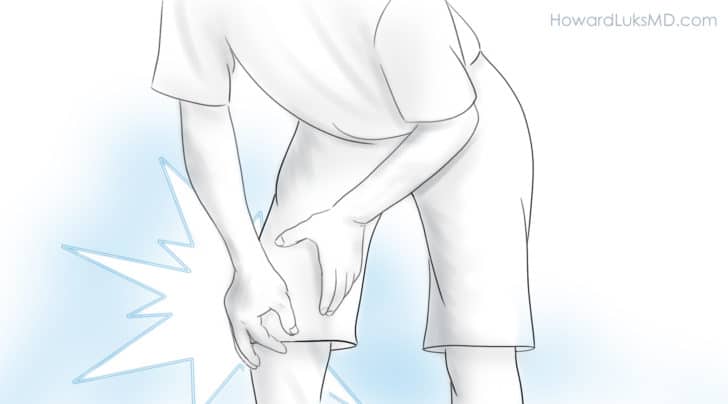
Your knee twists, you hear a pop, and now you have knee swelling and pain when trying to walk or with bending your knee. Perhaps you were struck by another player and have bruising, but no swelling. Are these severe knee injuries? When should you consider seeing a Sports Medicine Doctor following a knee injury? Let's go over 5 things that trained professionals look for to determine if your knee injury is serious.
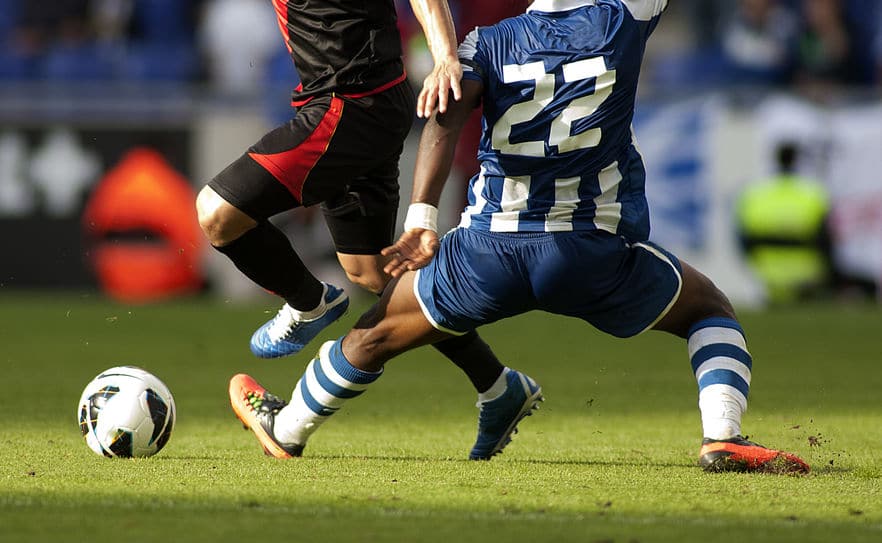
As an active athlete or competitor, you know that severe knee injuries are common. Both contact and non-contact knee injuries can be severe. This post will cover five signs to look for to help determine if you might have a severe knee injury. In general, the most common and worrisome finding is immediate, significant swelling.
Even though most of the injuries I see in the office turn out to be mild, it is essential for you to know what the warning signs are to look for a potentially severe knee injury.
Five signs of a potentially serious knee injury:
1. Your Knee Is Swollen
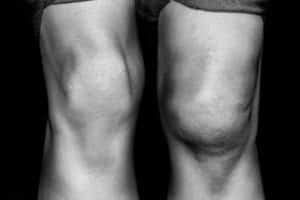 Swelling in the knee immediately or shortly after an injury is a common sign that indicates you may have sustained a serious knee injury. In many cases, the swelling is due to blood. The bleeding will stop, but the swelling will remain. Blood in the joint is called a hemarthrosis. Blood in the knee joint can cause a lot of pain due to inflammation. If we suspect that you have blood in your knee joint, that often means that you sustained a severe injury. The bleeding is usually due to something inside the knee tearing.
Swelling in the knee immediately or shortly after an injury is a common sign that indicates you may have sustained a serious knee injury. In many cases, the swelling is due to blood. The bleeding will stop, but the swelling will remain. Blood in the joint is called a hemarthrosis. Blood in the knee joint can cause a lot of pain due to inflammation. If we suspect that you have blood in your knee joint, that often means that you sustained a severe injury. The bleeding is usually due to something inside the knee tearing.
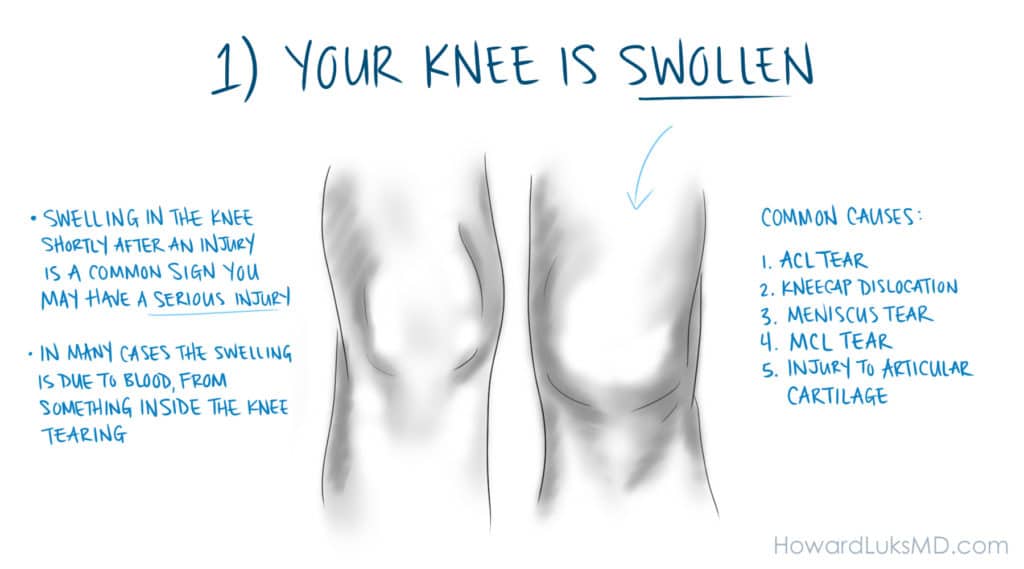
Common causes of swelling after a severe knee injury include:
- A tear of the ACL
- Patella or kneecap dislocation
- A meniscus tear: specifically a Bucket-Handle Tear.
- An MCL tear
- Injury to the articular cartilage.
Over 70% of athletes with a swollen knee who felt a pop while running and pivoting will have an ACL tear or a patella dislocation. Patella (kneecap) dislocations are more common than you think. All of you dread an ACL tear. But most of you are surprised when we see you in the office and tell you that your kneecap dislocated. Most dislocated kneecaps will reduce spontaneously on the field. That means that the kneecap will go back into place on its own.
Patellar dislocations may hurt just as much as an ACL tear. Because patella dislocations are such a common sports injury we wrote this post to go into far more detail about them.
With any of the above issues, most of you will find it very difficult to walk without severe knee pain. Crutches, icing, and elevation are beneficial in these cases. These knee joint injuries need to be evaluated for an X-ray. Fractures are rare, but they do occur. Very few knee injuries will require a brace unless you want to use it for comfort. The most important reason for seeing a sports medicine physician after an injury that causes swelling is to look for these most common severe injuries.
Many of these severe knee joint injuries should be evaluated sooner rather than later. The initial treatment will be a reliable examination to arrive at a diagnosis, which will be followed with an MRI to confirm the diagnosis. Depending on what we think you injured, we may consider rest, physical therapy, or surgery.
2. Your Knee Is "Locked" And You Can't Straighten It
If you had a knee injury and you are not able to fully straighten the leg, you might have a "locked knee." A locked knee is simply a knee that cannot fully straighten. There are different reasons a locked knee might occur. In some patients, swelling and inflammation can prevent you from fully straightening the knee. In others, a meniscus tear has flipped into the middle of the joint and is causing mechanical locking. You cannot straighten it with the meniscus in that position.
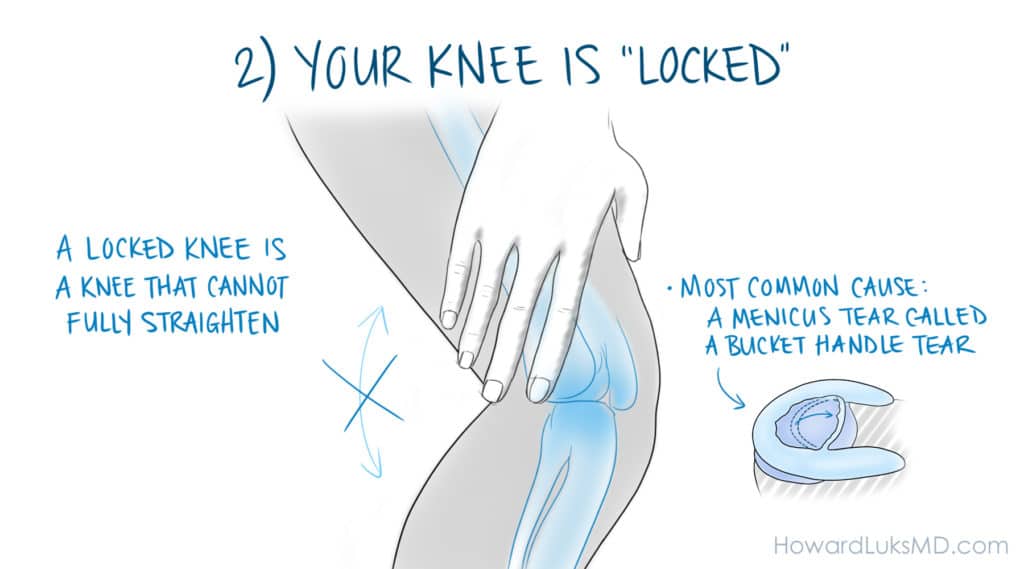
Many athletes who have a locked knee will also find it very painful to bend the knee too. They may feel sharp knee pain when bending which can occur when these bucket handle meniscus tears move.
The most common cause of a locked knee is a unique meniscus tear called a bucket handle tear. A bucket handle tear is considered a serious knee injury and will require surgery to fix or repair the tear. The reason these tears are serious is that a large piece of the meniscus tears flips over and becomes stuck in the middle of the knee joint. You need that meniscus to protect the knee. The vast majority of bucket-handle tears can be repaired. So the sooner we start the treatment process, the better the outcome might be after a meniscus repair.
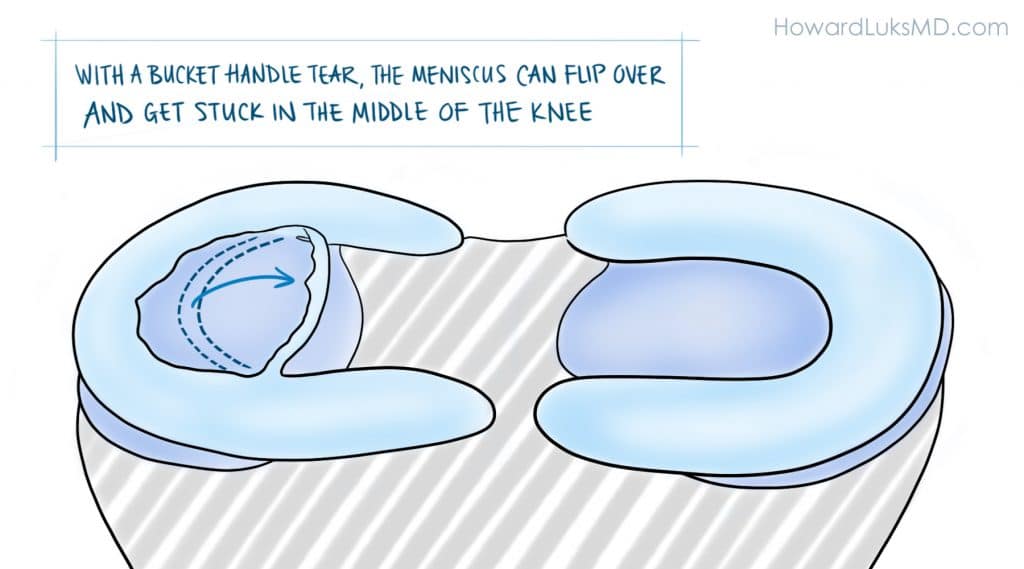
Although we discuss bucket handle tears here. Not all locked knees will be found to have a bucket handle tear. In older athletes, a flap tear, or different types of meniscus tears typically occur. These types of tears are also essential to identify early on. Most bucket handle tears are repairable. The torn bucket handle should not be removed from the knee, if at all possible. These tears, which cause a locked knee, are often very large. If the piece is removed and not repaired, then you have a significant chance of developing osteoarthritis. These bucket handle tears do not require emergency surgery, but they are urgent, and you should see a sports medicine doctor if you feel like something is preventing you from straightening your knee all the way.
Do I Have A Serious KNEE injury??? 5 Things to Look Out For
3. Your Knee Feels Unstable, or You Felt a Pop
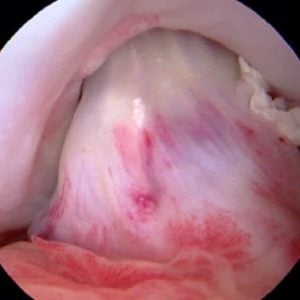
Most ACL tears and patella dislocations occur from a twisting, non-contact injury. A typical story is that you were turning or twisting hard, and you felt a pop. As I mentioned earlier, most patella dislocations will reduce or go back into their usual place on their own. But if your patella remains dislocated the knee will look strange.
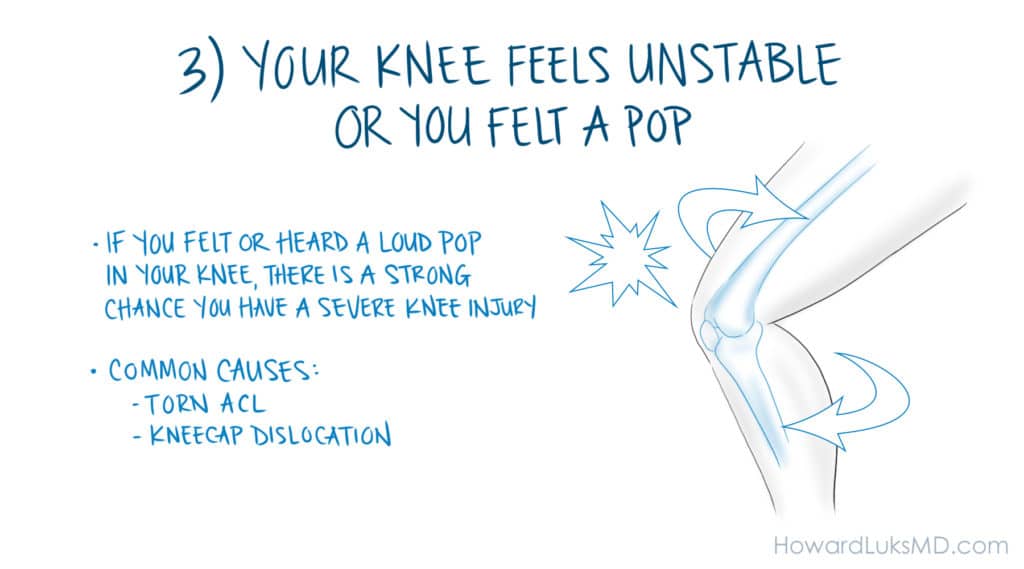
If you felt or heard a loud pop as you twisted or turned to avoid another player, then you may have torn your ACL. Other causes of popping include a patella or kneecap dislocation. If you felt or heard a loud pop in your knee, then there is a strong chance that you have a severe knee injury. Most ACL injuries and patella dislocations are non-contact injuries. A running back turning to head upfield. A striker moving laterally to avoid the defense. These are familiar stories when we see high school and college athletes who have torn their ACL.
This post dives further into the immediate management of suspected ACL injuries.
Once again, another prevalent severe knee injury following a loud pop is a patella dislocation. They are more common than most people think. Everyone has heard of an ACL tear, but most are not aware that the patella or kneecap can dislocate. Many patella dislocations will spontaneously reduce or go back into place. That means that the patella was only dislocated for a second or two. Patients with a patella dislocation often require an MRI to see if you injured the cartilage on the patella when it dislocated. Surgery to repair the patella ligaments is usually not necessary for a first dislocation. This post provides more information about patella dislocations.
4. You Have Significant Weakness Trying To Straighten Your Knee
Severe weakness when trying to straighten the knee, even a few days after the injury, could mean that you suffered a severe tendon injury. Common causes of weakness include patella dislocations, patella tendon tears, and quadriceps tendon tears. Patella tendon and quadriceps tendon tears are not common in youth or collegiate sports, but we will see a few of these every year.
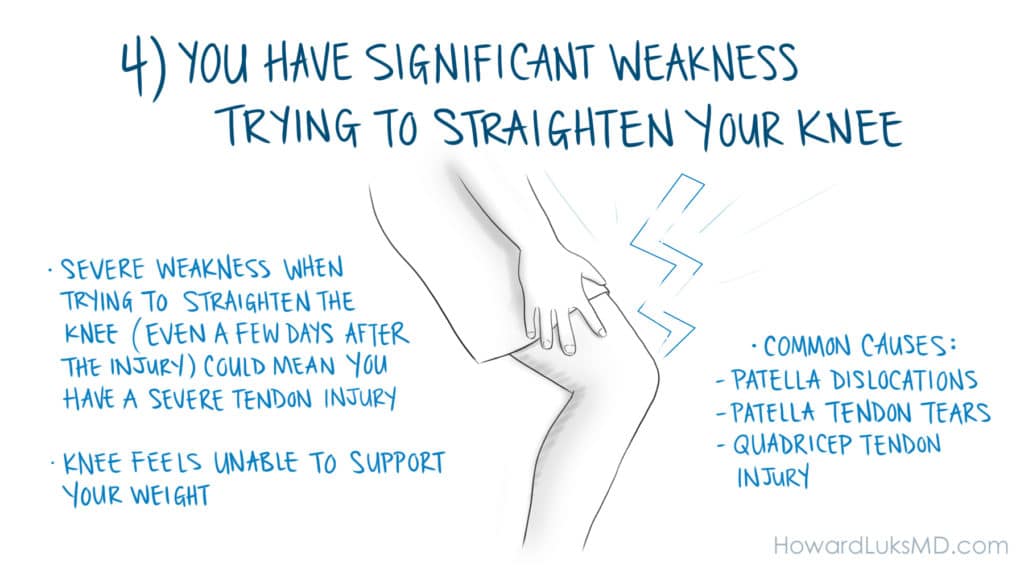
In older weekend warriors who are wondering why their knee is weak after a serious injury, patella tendon and quadriceps tendon injuries are far more common. If you are over 35 and felt a loud pop in your knee while pushing off during tennis, or basketball then you need to consider that you have seriously injured your patella or quadriceps tendon(s).
After an injury to one of these large, critically important tendons, you will find that the knee will feel unstable. You will think that the knee is unable to support your weight without giving way. You should be promptly evaluated by a Sports Medicine physician to determine the type of injury you had. Both quadriceps and patella tendon injuries require surgery to repair these large essential tendons.
We discuss the management of patella tendon injuries in this post. The management of quadriceps tendon tears is very similar.
Patella dislocations occur mostly in younger athletes. Most patella dislocations happen when the knee is bent, the athlete is twisting, and then they are struck on the inner side of the knee. The patella will usually snap back into place, but the damage is done. Any suspected patellar dislocation should be evaluated by a sports medicine physician since patella dislocations can cause injuries to the cartilage or the ligaments which hold the patella in place.
5. You Have Significant Difficulty Walking
Of course, many knee injuries make it painful and hard to walk. For people with severe knee injuries, it is usually very hard if not impossible to walk. You will often need to be helped off the field and require crutches. Anyone who is placed on crutches should be considered to have a serious knee injury until an Orthopedic Surgeon evaluates you. In many of these cases, an urgent X-ray is useful to rule out a fracture if the athlete cannot put any weight on the knee.
Take-Home Message: What to look for if you are worried that you might have a serious knee injury.
- Your knee is swollen
- You felt a pop
- Your knee is locked and will not straighten
- You have a significant weakness when trying to straighten the knee.
- You have persistent, significant difficulty walking or putting weight on your leg.
Knee injuries are common across all sports. Most knee injuries are mild, and the athlete can expect to return to play relatively soon. Identifying the serious or severe knee injuries and acting quickly can make all the difference when it comes to getting you back in the game and minimizing your risk of further damage.
The Back of Knee Has Been Hurting Fir Several Days and Today I Noticed What Looks Like a Bruise
Source: https://www.howardluksmd.com/signs-knee-injury-serious/
0 Response to "The Back of Knee Has Been Hurting Fir Several Days and Today I Noticed What Looks Like a Bruise"
Post a Comment